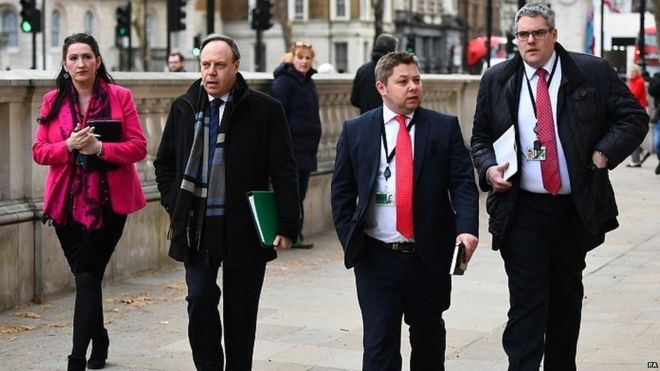
Ministers have held talks with the Democratic Unionists to try to get them to back Theresa May’s Brexit deal ahead of a third Commons vote on the package.
The DUP are seeking further legal assurances about the deal, which has been decisively rejected by MPs twice.
The PM has received a boost after Esther McVey, who quit the cabinet over Brexit policy last year, signalled she could vote for the deal next week.
She said the prospect of a long Brexit delay called for “different thinking”.
MPs voted on Thursday to ask the EU to push the date of Brexit back from 29 March to 30 June if the Commons approves a deal by next Wednesday – allowing time for legislation to go through.
However, if a deal is not agreed by then, EU leaders are contemplating a much longer delay.
Brexit Secretary Steve Barclay voted against the extension, despite saying in the Commons that voting for it would be in the “national interest”.
He told the BBC he would back a short extension to give time for legislation, but not a longer delay.
“If we don’t have a deal, then we should leave with no deal,” he said. “That’s always been my position. We shouldn’t be afraid to leave with no deal.”
The result prompted a number of Tory MPs to say they will back the deal in the next vote, due to take place by 20 March.
And the DUP, which has opposed the deal up to now, are seeking further “clarifications” on the government’s legal advice about the backstop – the controversial arrangement to prevent physical checks on the border between Northern Ireland and the Republic of Ireland – and how the UK could exit it.
A series of Brexit votes have taken place in the Commons:
However, as things stand, the law has not been changed, as Wednesday and Thursday’s votes were not legally binding.
That means the UK is still set to leave on 29 March – with or without a deal.
While legally, there does not have to be a delay, politically it might be hard for Mrs May to avoid.
Thursday’s motion saw Parliament agree to two options for a delay:
Any delay will require the agreement of all other 27 EU members and talks about possible conditions could take place before the summit.
European Council President Donald Tusk said EU leaders could be open to a long extension “if the UK finds it necessary to rethink its Brexit strategy”.
Cabinet Office minister David Lidington, who is regarded as Mrs May’s de facto deputy, told the BBC that, although the risk of the UK leaving without a deal had “diminished” as a result of this week’s votes, it could still happen unless an alternative solution was found.
He urged MPs to “reflect” over the weekend on the deal on the table, which he said had the “great virtue” of having the backing of all 27 other EU governments and, most likely, the European Parliament too.
“I think there is some real impatience among the British public, and frankly among other EU governments, with this inability to agree in Westminster on the way forward,” he told BBC Radio 4’s Today programme.
“The alternative, spelt out very clearly and accepted by the House of Commons, is that you don’t just have a short technical extension to our membership. You almost certainly need a significantly longer one.”
EU politicians breathe deep, shuddering sighs at the thought of prolonging the cross-Channel agony of the Brexit process.
So will they or won’t they agree to an extension? What conditions could they demand and how long would Brexit be delayed by?
Like so many things to do with Brexit – the answer is: we’re not 100% certain.
Earlier this week, a number of EU leaders including France’s Emmanuel Macron, Mark Rutte of the Netherlands and Spain’s Pedro Sanchez sounded pretty hard-line.
They wouldn’t agree to delay Brexit, they said, unless the prime minister came up with a very good reason.
EU leaders are frustrated, irritated and fatigued by the Brexit process but it’s also worth bearing in mind that they have two specific audiences in mind these days when they take to the cameras.